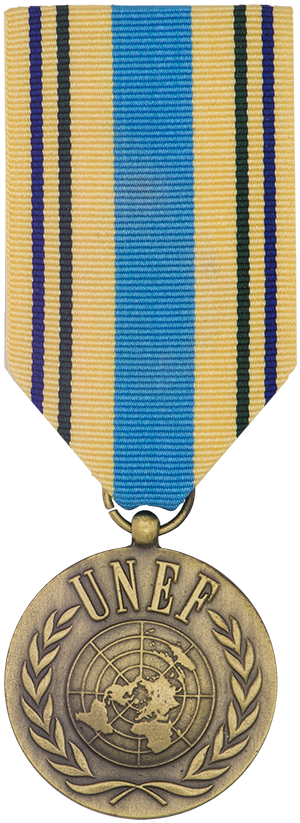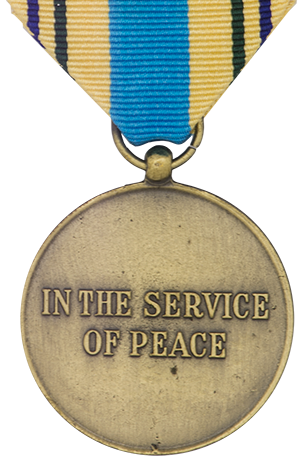UN Emergency Force (UNEF)
The official description, eligibility, criteria, and history of the UN Emergency Force (UNEF).


Context
Through the efforts of Canada's External Affairs Minister, Lester B. Pearson, the UN General Assembly agreed to its first peacekeeping force to secure peace in the region (previous operations had been only observer forces). Under the command of a Canadian, MGen Eedson Louis Millard BURNS, (OC) DSO OBE MC, the UNEF, on 07 November 1956, was given a mandate to secure the removal of Israeli, British, and French troops from the Suez canal zone and the Gaza Strip and to maintain peace in the area. The first Canadian troops arrived in Egypt on 24 November 1956, and Egypt abruptly asked them to leave in May 1967, leading to the six-day war between Israel and Egypt. Thirty-two Canadians lost their lives serving with this force.
Eligibility and criteria
Awarded for 90 days consecutive service between 07 November 1956 to 17 June 1967.
The UN strictly applies their medals policy and will not consider requests for initial issue of the UN medals that are submitted more than one year after repatriation from the mission area.
The qualifying service is not required for members killed or presumed killed while on assignment. In such cases, the medal may be awarded posthumously.
Description
A circular bronze alloy medal, 1.4 inches (35mm) in diameter.
On the obverse, the emblem of the United Nations with the addition of the curved letters UNEF.
On the reverse, an inscription bearing the words “IN THE SERVICE OF PEACE” (only in English).
A 0.5 inch (12mm) bronze ring, which holds the ribbon, passes through a small hollow ball at the top of a claw joined to the top of the medal.
The ribbon has a background of a sand or buff colour symbolizing the Sinai with a wide centre band of UN blue. Two thin lines in dark blue and green appear at either end of the ribbon: the blue representing the Suez Canal, and the green, the Nile Valley.
Bar(s)
There is no bar to this medal.
Wearing
The medal shall be worn in sequence prescribed in the Canadian Orders, Decorations and Medals Directive, and in the following manner: on the left breast, suspended from the ribbon described above, after the Canadian Peacekeeping Medal and before the UNTSO medal.
Post-nominals
The use of a post-nominal is not authorized for this medal.
Historical notes
The following is a list of members who have died while serving in the theatre of operations
- Pte Adams B.O.
- Cpl Albert J.M.
- Tpr Allan R.H.
- Tpr Bons A.A.
- Sig Crouse P.M.
- Cpl Edwards N.
- F/O Edwards R.V.
- Pte Fickling E.J.
- Cpl Gauthier G.A.
- Cpl Groom E.G.
- W/C Harper E.D.
- Sgt Hermann J.K.
- Pte Hurst A.T.
- Pte Lamothe D.A.J.
- Spr Lorienz R.F.
- Sig Mason N.E.
- Tpr McDavid G.E.
- Maj Morewood H.
- Pte Morin L.R.
- Cpl Oliver E.
- Cpl Pennell K.E.
- F/O Picard J.M.L.P.
- Cpl Porter G.S.
- Cpl Roberts J.T.
- Cpl Roster D.S.
- Pte Sawyer I.A.
- Sgt Stark I.L.
- Spr Thompson G.G.
- Lt Van Straubenzee C.C.
- Spr Vezina R.H.
- Cpl Wallace P.R.
- Tpr Wiley R.J.